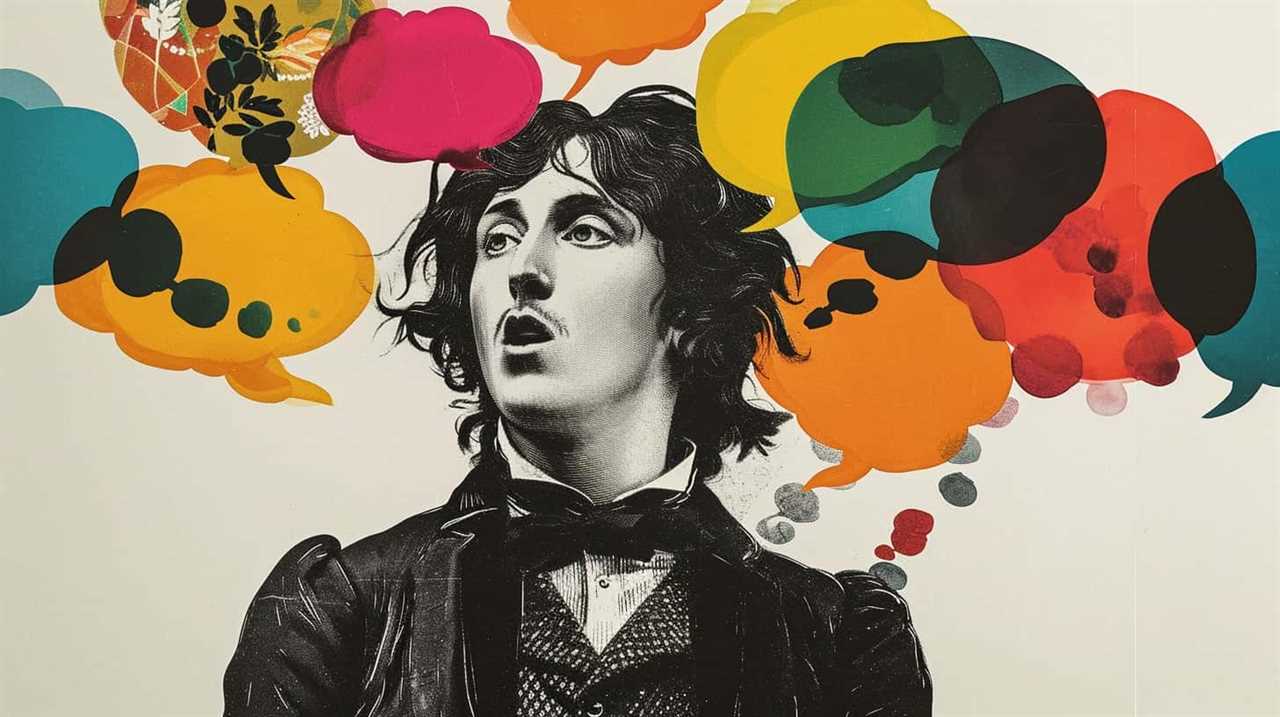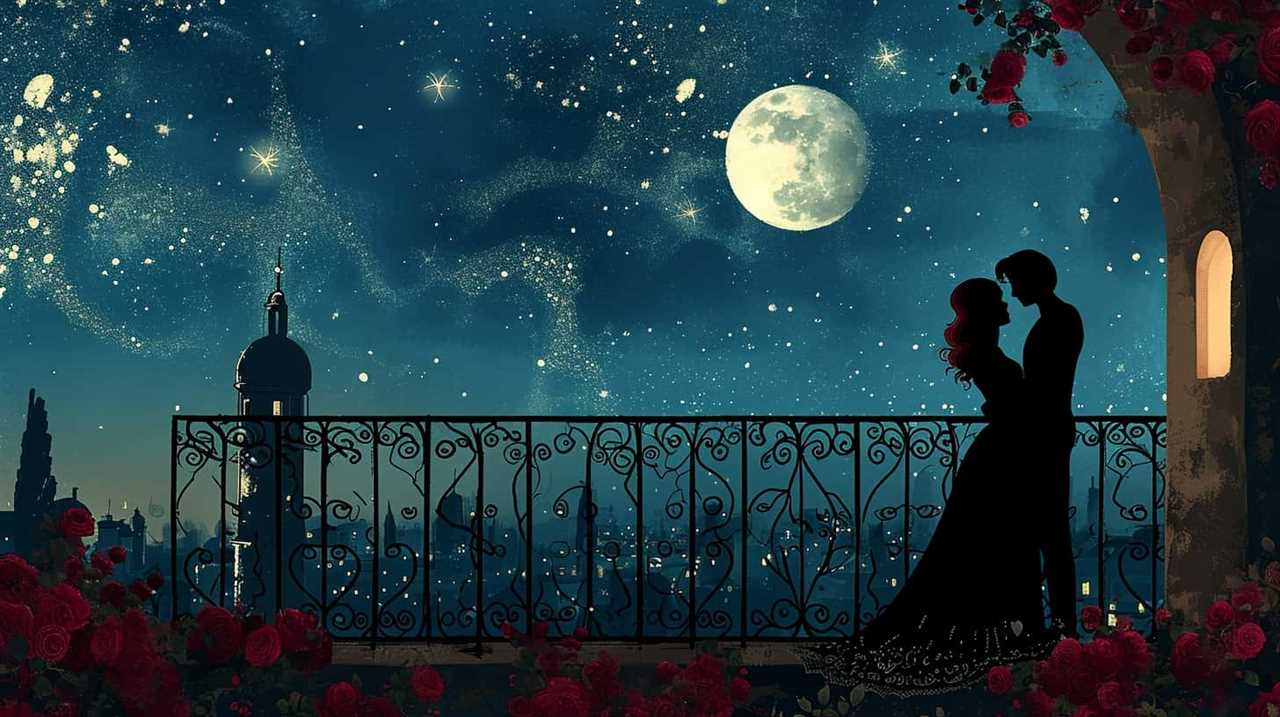Step into the world of timeless literature, where thought-provoking quotes guide the path to discovering life’s true essence. Dive into the depth of timeless tales and uncover the profound philosophical insights that reside within.
Through the pages of renowned novels, you will embark on a journey of self-discovery, contemplating the ultimate questions of existence. These literary gems provide a platform for deep reflection and offer unique perspectives on the human condition.
Allow the words of classic authors to guide you in your search for purpose and understanding. In this exploration, you will find innovation and inspiration, as these quotes uncover the profound truths that lie within the pages of these timeless works.
Embrace the power of classic literature, and let it illuminate the path to uncovering life’s meaning.

Key Takeaways
- Classic literature offers profound insights and perspectives on the human condition, delving into existentialist themes and exploring the fundamental questions of existence.
- Existentialism in classic literature emphasizes individual freedom, responsibility, and the meaninglessness of life, as revealed through quotes from works like ‘Notes from Underground’ and ‘The Stranger’.
- Literary quotes from classic literature can inspire and guide readers in their pursuit of purpose, prompting self-reflection and questioning of beliefs and values.
- Classic novels contain deep reflections on life, forcing readers to confront questions of existence and meaning and providing opportunities for introspection and contemplation.
The Meaning of Life in Classic Texts
Discovering the meaning of life in classic texts can offer you profound insights and a deeper understanding of the human experience. Classic literature has long delved into existentialist themes and conveyed philosophical messages that resonate with readers across generations. These timeless works explore the fundamental questions of existence, purpose, and the nature of reality.
In texts like Fyodor Dostoevsky’s ‘Crime and Punishment,’ the protagonist’s inner turmoil reflects the existential struggle to find meaning in a chaotic world. Through the character of Raskolnikov, Dostoevsky challenges readers to confront the consequences of moral choices and grapple with the nature of guilt and redemption.
Similarly, Albert Camus’ ‘The Stranger’ presents a protagonist detached from societal norms and plagued by existential questions. Through the lens of Meursault’s indifferent worldview, Camus explores the absurdity of life and the futility of searching for objective meaning.
Classic texts not only offer thought-provoking narratives but also invite readers to contemplate their own existence and the human condition. By engaging with these works, you can gain a deeper appreciation for the complexities of life and develop a more nuanced perspective on the world around you.

As you explore the existentialist themes and philosophical messages within classic texts, you may find yourself questioning your own beliefs and values. These texts challenge societal conventions and encourage critical thinking, pushing you to examine your own place in the world and the meaning you ascribe to your own existence. In this way, classic literature can serve as a catalyst for personal growth and intellectual exploration.
Exploring Existentialism in Literary Quotes
How can literary quotes shed light on the existentialist themes found in classic texts?
The exploration of existentialism in modern literature is greatly influenced by the impact of classic literature on contemporary philosophy. Literary quotes serve as windows into the existentialist themes that pervade these timeless texts, allowing readers to delve into the depths of human existence and the search for meaning.
Existentialism, a philosophical concept that emerged in the 19th and 20th centuries, emphasizes the individual’s freedom, responsibility, and the inherent meaninglessness of life. Classic works such as Fyodor Dostoevsky’s ‘Notes from Underground’ and Albert Camus’ ‘The Stranger’ are prime examples of texts that delve into existentialist themes. By examining quotes from these works, readers can gain insight into the existentialist philosophy that underlies them.

For instance, in ‘Notes from Underground,’ the protagonist muses, ‘I am a sick man… I’m a spiteful man.’ This quote encapsulates the sense of alienation and disillusionment that characterizes existentialism. Similarly, in ‘The Stranger,’ the famous quote, ‘In our society, any man who doesn’t weep at his mother’s funeral runs the risk of being sentenced to death,’ reveals the absurdity and meaninglessness of societal norms.
Finding Purpose Through Classic Literature
To further explore the existentialist themes found in classic literature, you can find purpose through the profound insights offered by literary quotes. These quotes have the power to inspire and motivate, serving as a source of guidance and self-discovery. Often, we find ourselves searching for motivation and a sense of direction in our lives. Classic literature provides us with timeless wisdom, offering valuable lessons and perspectives that can help us navigate our own journeys.
Through the words of renowned authors, we can uncover hidden truths about ourselves and the world around us. These quotes serve as a catalyst for self-reflection, prompting us to question our beliefs and values. They encourage us to examine our own desires, passions, and dreams, ultimately leading us towards a deeper understanding of ourselves.
Literary quotes offer a unique opportunity for self-discovery. They provide us with a glimpse into the minds of characters who grapple with the same existential questions that we do. By immersing ourselves in their stories, we can find solace in the realization that we aren’t alone in our search for purpose. These quotes remind us that our own experiences are part of a larger narrative, one that has been explored and contemplated by generations before us.

In the subsequent section, we’ll delve into deep reflections on life in classic novels, further uncovering the profound insights they offer.
Deep Reflections on Life in Classic Novels
As you delve into the world of classic novels, you frequently encounter deep reflections on life that offer profound insights. Classic literature has the power to provoke existential crises, forcing us to confront the fundamental questions of existence and meaning. It’s through the exploration of these themes that we come face to face with the tenets of existentialist philosophy.
In classic novels, characters often grapple with their own existence, questioning the purpose of their lives and the meaning behind their actions. This introspection allows readers to reflect on their own lives and contemplate the bigger picture. Through the lens of existentialist philosophy, classic novels present the idea that life has no inherent meaning and that it’s up to individuals to create their own purpose.
Authors like Fyodor Dostoevsky, Franz Kafka, and Albert Camus delve into the depths of human existence, portraying characters who are tormented by existential crises. These characters are confronted with the absurdity of life, the inevitability of death, and the futility of their actions. Through their struggles, readers are prompted to question their own existence and search for meaning in a seemingly chaotic world.

Classic novels, with their profound insights and existentialist undertones, offer readers the opportunity for deep reflection on life’s most fundamental questions. They challenge us to confront our own existential crises and encourage us to find meaning through personal exploration and self-discovery.
Philosophical Insights in Classic Literary Works
Delving into classic literary works exposes you to profound philosophical insights that unravel the complexities of life. These timeless texts provide a window into existentialist perspectives and present moral dilemmas that continue to resonate with readers today. Authors such as Fyodor Dostoevsky in ‘Crime and Punishment’ and Albert Camus in ‘The Stranger’ delve into the existentialist philosophy, exploring the meaning of life and the individual’s search for purpose in an indifferent world. Through their characters’ experiences, they shed light on the human condition and challenge readers to reflect on their own existence.
Classic literature also confronts us with moral dilemmas that force us to examine our values and beliefs. In works like Harper Lee’s ‘To Kill a Mockingbird’ and Herman Melville’s ‘Moby-Dick,’ we encounter characters who grapple with ethical choices that have far-reaching consequences. These narratives not only entertain but also serve as catalysts for introspection, inviting readers to question their own moral compass and consider the complexities of right and wrong.
Uncovering Truths About Life in Classic Texts
As you explore classic texts, you’ll encounter profound insights that offer a deeper understanding of life. These works aren’t merely stories, but windows into universal themes that resonate across time and cultures.

Through the wisdom of authors long gone, you can uncover timeless truths about the human experience and gain valuable perspectives on the complexities of existence.
Profound Insights in Classics
Discover profound insights about life by exploring the classic texts with a keen eye for the underlying truths they hold. Classic literature often offers existentialist perspectives and presents moral dilemmas that force us to question our own beliefs and values. These timeless works allow us to delve into the complexities of human existence and contemplate the meaning of life.
To help you grasp the profound insights found in classic literature, here is a visual representation of ideas:
| Classic Texts | Profound Insights | Underlying Truths |
|---|---|---|
| "1984" | The dangers of totalitarianism | Loss of personal freedom |
| "To Kill a Mockingbird" | The injustice of racism | The importance of empathy |
| "Hamlet" | The struggle with indecision | The consequences of inaction |
| "Pride and Prejudice" | The complexities of love | The impact of societal norms |
| "Crime and Punishment" | The battle between guilt and redemption | The power of conscience |
Universal Themes in Literature
To truly uncover the truths about life within classic texts, you must explore the universal themes that are woven throughout these literary masterpieces. These themes serve as a lens through which we can examine and understand the human experience.

One such theme that often arises in classic literature is the exploration of existentialist perspectives. Authors like Albert Camus and Fyodor Dostoevsky delve into the complexities of existence, grappling with questions of meaning, freedom, and the absurdity of life. Through their characters’ philosophical musings, these writers invite us to reflect on our own existence and contemplate the nature of our reality.
Timeless Wisdom From Texts
Delve into the pages of classic literature and uncover timeless wisdom that reveals profound truths about life. In these texts, you’ll find a treasure trove of philosophical musings and thought-provoking insights that invite you to explore life’s purpose. From the works of Shakespeare to the novels of Jane Austen, these timeless classics offer a wealth of knowledge and guidance for those seeking a deeper understanding of the human experience.
Through the words of these literary giants, you’ll encounter profound questions about the meaning of life, the nature of existence, and the pursuit of happiness. Their stories and characters provide a mirror through which we can examine our own lives and contemplate the complexities of the human condition.
By immersing yourself in classic literature, you embark on a journey of self-discovery and enlightenment. You gain access to a world of ideas and perspectives that have stood the test of time. These texts serve as a reminder that the questions we ask and the struggles we face are universal and timeless.

Wisdom and Enlightenment in Classic Literature
As you journey through the pages of classic literature, you’ll come across profound insights that can guide you towards wisdom and enlightenment. Classic literature has long explored the themes of wisdom and self-discovery, often delving into the existential questions that plague the human mind.
Novels such as Fyodor Dostoevsky’s ‘Crime and Punishment’ and Herman Melville’s ‘Moby-Dick’ grapple with the complexities of human existence, offering readers a window into the depths of the human psyche.
In ‘Crime and Punishment,’ Dostoevsky examines the moral consequences of one’s actions, highlighting the transformative power of guilt and redemption. Through the character of Raskolnikov, Dostoevsky explores the weight of moral responsibility and the potential for redemption through self-reflection and acceptance of one’s past.
Similarly, Melville’s ‘Moby-Dick’ delves into the existential themes of purpose and meaning in life. Captain Ahab’s obsessive quest for revenge against the white whale becomes a metaphor for the human struggle to find meaning in a chaotic and indifferent world. The novel forces readers to confront the limits of human knowledge and the futility of trying to control fate.

Probing the Depths of Human Existence in Books
You frequently explore the depths of human existence in books, uncovering profound insights into the complexities of life. Classic literature has long been a rich source of existential themes, delving into the very essence of our existence and challenging our understanding of self and reality. Here are four ways in which classic literature probes the depths of human existence:
- Questioning the Meaning of Life: Classic literary works often confront the existential crisis, prompting readers to question the purpose and significance of their existence. Through vivid characters and thought-provoking narratives, these books invite us to examine our own lives and contemplate the deeper meaning behind our actions.
- Exploring the Nature of Identity: From Shakespeare’s Hamlet to Dostoevsky’s Crime and Punishment, classic literature delves into the intricate layers of human identity. These works expose the conflicts and contradictions within ourselves, forcing us to confront our own fears, desires, and the complexities of our own being.
- Examining the Absurdity of Existence: Many classic literary works tackle the absurdity of human existence, highlighting the inherent contradictions and irrationality of life. Through dark humor and poignant storytelling, these works confront the inevitable questions of mortality, purpose, and the futility of our pursuits.
- Seeking Freedom and Authenticity: Classic literature often explores the pursuit of freedom and authenticity in a world that imposes societal norms and expectations. These books challenge us to question the structures that confine us and encourage us to seek our true selves, even in the face of adversity.
The Search for Meaning in Classic Novel Quotes
As you embark on your quest to find meaning in classic novel quotes, you’ll discover a treasure trove of literary wisdom on purpose.
From the depths of human existence, these timeless novels offer insights that resonate with the complexities of life.
Through the words of esteemed authors, you’ll be guided on a thought-provoking journey, where the search for meaning intertwines with the power of storytelling.

Literary Wisdom on Purpose
Uncover profound insights on the pursuit of purpose through the timeless wisdom found in classic novel quotes. These literary gems offer valuable guidance on living a purposeful life, drawing from the rich tapestry of human experiences depicted in these timeless works of literature.
Here are four key takeaways that can inspire you on your own journey towards purposeful living:
- Embrace the existentialist philosophy: Many classic novels explore the existentialist theme of finding meaning in an inherently meaningless world. They urge us to create our own purpose and define our own values.
- Question societal expectations: These novels challenge societal norms and encourage us to question the status quo, prompting us to discover our authentic selves and pursue our true passions.
- Seek self-discovery: The protagonists’ quests for meaning in these novels often involve deep introspection and self-discovery. They remind us of the importance of knowing ourselves and understanding our desires and motivations.
- Find purpose in relationships: Classic novels emphasize the significance of human connections and how they can contribute to our sense of purpose. They teach us the value of empathy, love, and compassion in our relationships with others.
Insights From Timeless Novels
Continuing the exploration of purpose in classic literature, delve into the profound insights offered by timeless novels to uncover the search for meaning through their thought-provoking quotes.
These novels often provide existentialist perspectives, forcing readers to grapple with the fundamental questions of human existence. One such example is Fyodor Dostoevsky’s ‘Crime and Punishment,’ which presents the moral dilemma faced by the protagonist, Raskolnikov. Through his internal struggle, Dostoevsky prompts readers to question the consequences of one’s actions and the significance of morality in determining the meaning of life.

Similarly, in Harper Lee’s ‘To Kill a Mockingbird,’ Atticus Finch’s unwavering commitment to justice forces us to confront our own moral compass and ponder the purpose of fighting for what’s right.
These timeless novels not only entertain but also offer profound insights into the search for meaning, challenging us to reflect on our own existence.
Contemplating Life’s Ultimate Questions in Literature
Explore life’s ultimate questions through the profound insights found in classic literature. Philosophical exploration and existentialist literature have long been avenues for individuals to contemplate the deeper meaning of life. Through the timeless words of renowned authors, these works provide thought-provoking perspectives on the existential questions that have captivated humanity for centuries.
Here are four ways in which classic literature encourages us to reflect on life’s ultimate questions:

- Self-Reflection: Classic literature prompts us to examine our own existence and purpose. It challenges us to question our beliefs, values, and desires, encouraging introspection and self-discovery.
- Morality and Ethics: These works often explore the nature of good and evil, right and wrong. They compel us to contemplate the ethical dilemmas we face and the choices we make, pushing us to consider the consequences of our actions.
- Meaning and Purpose: Classic literature invites us to ponder the meaning and purpose of life. It prompts us to ask ourselves what truly matters and what legacy we wish to leave behind.
- Mortality and Transcendence: These works confront the inevitability of death and explore the possibility of something beyond our earthly existence. They challenge us to confront our own mortality and consider the concept of transcendence.
Through the contemplation of life’s ultimate questions in classic literature, we’re invited to delve deeper into our own existence, finding meaning and purpose in the process. By engaging with these profound insights, we can gain a greater understanding of ourselves and the world around us, inspiring innovation and growth.
Insights on the Human Condition From Classic Authors
Classic authors have an extraordinary ability to capture the essence of the human condition in their works. Their timeless wisdom offers valuable insights into the complexities of human nature and the universal truths that shape our existence.
Through their writing, they invite us to explore the depths of our own humanity and gain a deeper understanding of the world around us.
Authors’ Timeless Wisdom
Are you curious about the timeless wisdom and insights on the human condition that classic authors have to offer? Their works aren’t just mere stories; they hold profound existentialist perspectives and philosophical musings that continue to resonate with readers today.

Here are four key insights from classic authors that shed light on the complexities of the human experience:
- Albert Camus reminds us of the absurdity of life and the need to find meaning in the face of it.
- Virginia Woolf explores the intricacies of human consciousness and the subjective nature of reality.
- Fyodor Dostoevsky delves into the depths of the human psyche, exposing the complexities of morality and the battle between good and evil.
- Jane Austen offers astute observations on the societal pressures and expectations that shape human relationships and identities.
These authors’ timeless wisdom and insights challenge us to reflect on our own lives and find deeper meaning in the complexities of the human condition.
Reflecting on Human Nature
As you delve into classic literature, you’ll uncover profound insights on the human condition, shedding light on the complexities of human nature. Classic authors have long been fascinated by the duality of good and evil that exists within each of us. Through their works, they explore the depths of human emotions, exposing the intricacies that make us who we are. In their writings, you’ll find characters grappling with their inner demons, torn between their virtuous impulses and their darker desires. This exploration of human nature serves as a powerful reminder that we’re all capable of both great good and great evil. It challenges us to question our own motivations and understand the complexities of our own emotions. Through classic literature, we gain a deeper understanding of what it means to be human.
Transitioning into the subsequent section about ‘universal truths in literature’, we find that these insights on human nature are just one aspect of the broader truths that literature has to offer.

Universal Truths in Literature
Delve further into classic literature to uncover universal truths about the human condition, as renowned authors offer profound insights on the complexities of our nature.
The universality of human experience is a key theme in literary classics, reminding us that despite our differences, we share common struggles, desires, and emotions. Through the characters and narratives, these works shed light on the fundamental aspects of being human, allowing us to connect and empathize with people from different times and cultures.
The significance of literary classics lies in their ability to transcend time and speak to the universal human experience. They provide us with a deeper understanding of ourselves and others, enabling us to navigate the complexities of life with greater wisdom and compassion.
Frequently Asked Questions
How Can Classic Literature Quotes Help Us Understand the Meaning of Life?
Classic literature quotes can help you understand the meaning of life by employing symbolism to convey profound ideas. By exploring the impact of these quotes, you can experience personal growth and gain insight into life’s complexities.

What Are Some Examples of Classic Literature Quotes That Delve Into Existentialism?
Looking for classic literature quotes that delve into existentialism? Explore the impact of these quotes on understanding life’s meaning. See how authors use powerful words to unravel the complexities of existence.
How Can Classic Literature Help Us Find Purpose and Meaning in Our Own Lives?
Classic literature provides a window into the human experience, allowing you to explore different perspectives and reflect on your own journey. Through the experiences of characters, you can find purpose and meaning, guiding your own path of self-discovery.
Are There Any Specific Classic Novels That Offer Deep Reflections on Life?
Are there classic novels that offer deep reflections on life? Absolutely. Dive into the existentialist themes of classics like "Crime and Punishment" or "The Stranger" and experience the profound impact of literature on personal growth.
Can Classic Literary Works Provide Philosophical Insights Into the Nature of Existence?
Exploring the existential themes in classic literature allows for a deeper understanding of the nature of existence. Analyzing the impact of these works on philosophical thought reveals the timeless wisdom they offer.

Conclusion
In conclusion, the timeless wisdom found in classic literature offers valuable insights into the meaning of life. By exploring existentialism, reflecting on deep philosophical questions, and delving into the depths of human existence, these literary works provide a profound understanding of the human condition.
Despite any objections that may arise, the power of these quotes and novels can’t be denied. They serve as a visual representation of the ideas that have the ability to enlighten and provoke contemplation on life’s ultimate questions.
Lauren’s talent in writing is matched by her passion for storytelling. Her love for books and deep understanding of culture and entertainment add a distinct flavor to her work. As our media and press contact, Lauren skillfully bridges the gap between afterQuotes and the broader media landscape, bringing our message to a wider audience.










